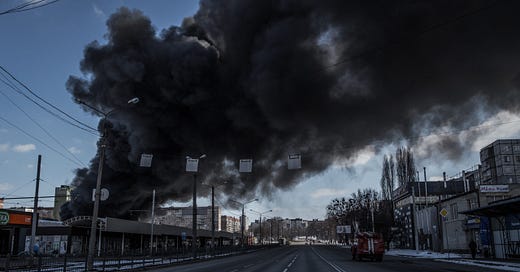
From the start of the Ukraine/Russia conflict in 2014, claims that the new post-Euromaidan Ukraine—or at least its leadership—was a neo-Nazi wolf in liberal clothing figured prominently in pro-Kremlin discourse. Indeed, the “de-Nazification” of Ukraine was one of Vladimir Putin’s stated goals as he announced the invasion on February 24. But this narrative, already lacking in credibility eight years ago (despite the very real presence of some far-right radicals among the Euromaidan protesters and fighters), has been even harder to sustain today when the “neo-Nazi junta” is led by Ukraine’s first Jewish President, Volodymyr Zelensky. Yet in the past couple of days, the “Ukrainian Nazis!” trope has had a big revival in the pro-Kremlin corners of social media thanks to a shocking video clip from one of Ukraine’s main TV channels, Ukraine-24. In it, the presenter is seen openly calling for a genocide of Russians, including Russian children, and actually quoting Adolf Eichmann while making his point. The Twitter account of the Russian Ministry of Foreign Affairs posted the video clip yesterday and gloated as if in vindication:
No Nazism in Ukraine they said...
Ukrainian TV, prime time. The host quotes Adolf Eichmann (SS Nazi, one of the major organisers of the Holocaust!) and urges to kill all Russians, including children...
No Nazism in Ukraine they said... pic.twitter.com/uJ5nKwFRwz— MFA Russia 🇷🇺 (@mfa_russia) March 16, 2022
Far-left American journalist Dan Cohen, recently left unemployed by the shutdown of Putin’s propaganda network RT America, also tweeted out the clip to 79,000 followers: https://twitter.com/dancohen3000/status/1503829062556520448 There is no question that the clip looks terrible, especially with that Eichmann photo onscreen. But as often happens, the context makes a difference. For one, the people circulating the clip conveniently forgot to mention that it immediately followed a segment in which the presenter, Fahruddin Sharafmal, burst into tears while talking about the death in combat of his friend, marine company commander Pavel Sbitov. (Indeed, Sharafmal can be seen wiping away tears at the start of the clip circulated by Russian propagandists and their Western friends.) Nor did they mention that the very next day, Sharafmal made a statement of apology on the air:
I ask your forgiveness for my outburst yesterday. It was unacceptable from both a journalistic and a human standpoint. Ukrainians are not barbaric like Russians; we are first and foremost human. My pain of loss and sadness took over, which is why I apologize. We respect all international norms, including the Geneva convention, and will not allow the same genocide as the one happening right now on Ukrainian territory. But this rule does not apply to those Russians who came here to kill our people.
(Many thanks to Helen Piontkivska for help with translation from Ukrainian.) For what it’s worth, the general director of the Lux corporation, which owns Channel 24, Roman Andreiko, issued his own apology for the “deplorable incident during a live broadcast”:
The journalist Fahruddin Sharafmal, who had just found out that a close friend of his had died in this war, was overcome by emotion and made an outburst that was at odds not only with the editorial stance of Channel 24, but with the universal moral norms of humanity.
Andreiko asked for forgiveness on behalf of the entire Channel 24 team, stressing Sharafmal’s sincere contrition and pointing out once again that the presenter’s emotions had gotten the better of “common sense and our actual moral values and world-view.” But he also had some harsh words for the Russian propaganda machine’s exploitation of the clip. Last but not least: while the translation supplied in the propaganda version of the clip was accurate, the visual was creatively embellished with a black-and-white photo of Eichmann. That’s right: According to the Channel 24 website, the Eichmann photo which seems to clinch the “Nazi propaganda” label—and which implies that Sharafmal’s producers had signed off on his commentary—was not a part of the actual broadcast. Or, to put it plainly: the clip was doctored. It’s also worth noting that Sharafmal is, as Andreiko pointed out in his statement, a rather poor candidate for “Ukrainian Nazi”: he is a brown-skinned ethnic Afghan, i.e., the kind of person who would not fare well in a country dominated by neo-Nazis or extreme ethnonationalists. I suppose one could see him as Ukraine’s answer to Dave Chappelle’s Clayton Bigsby, “the world’s only black white supremacist.” Or one could believe his explanation and see his tirade as a terrible response to the terrible war that Vladimir Putin has inflicted on his country.
None of this gets Sharafmal off the hook. Contrary to the French saying, to understand is not necessarily to excuse. No matter what your emotional state, if you start a statement with “As Adolf Eichmann said . . .,” that’s a good sign you shouldn’t say it. Also, “if they’re calling us fascists and Nazis, we might as well start talking like fascists and Nazis” is a hideous argument whether it comes from American deplorables or Ukrainians caught in the passions of war (though grief for the loss of a friend—and, more broadly, the devastating losses Ukraine is suffering every day—is surely a mitigating circumstance). One could also argue, quite reasonably, that producers at the studio should have noticed Sharafmal’s distraught state and taken him off the air. But let’s face it: If we’re going to talk about Nazis, what Putin’s soldiers are doing in Ukraine right now is a hell of a lot closer to what the Nazis did than one young and distraught TV journalist’s ugly outburst. One might add that, around the same time Sharafmal was apologizing for his comments, Russian state television was broadcasting calls for public hangings in Ukraine after its presumed “liberation” by Russian troops—and illustrating its message with 1945 footage of the public hanging of Nazi collaborators in the Kyiv square that would later become the Maidan. No apology, one may assume, is forthcoming.




